| Srl | Item |
| 1 |
ID:
158141
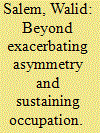

|
|
|
|
|
| Summary/Abstract |
Third party mediation is critical in pushing forward a new peace process that is based on Israeli and Palestinian compliance in fulfilling previous agreements, including an Israeli freeze on settlements. The freeze will be part of a transformative constructionist process that will allow both sides to negotiate from a more symmetrical position. It will also create more trust among the Palestinians by communicating that Israeli intentions are not about grabbing their land while discussing peace.
|
|
|
|
|
|
|
|
|
|
|
|
|
|
|
|
| 2 |
ID:
158139
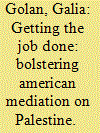

|
|
|
|
|
| Summary/Abstract |
Inasmuch as the 2015 Israeli elections brought to power a Netanyahu-led coalition even more ideologically opposed to the creation of a Palestinian state than the previous coalitions, the absence of political will to reach agreement would appear to prejudge the outcome of any future negotiations should they take place. For this reason, recommendations to improve American mediation efforts remain in the realm of theory, but nevertheless may provide useful suggestions for the more basic step of returning the sides to serious negotiations.
|
|
|
|
|
|
|
|
|
|
|
|
|
|
|
|
| 3 |
ID:
158140
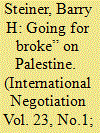

|
|
|
|
|
| Summary/Abstract |
This article, a corrective to long-time frustration experienced by the United States in mediating Israel-Palestine differences, argues for American recognition of a Palestinian state to reach a two-state solution. Recognition, though not even-handed, constitutes legitimate mediation, as confronting one or another primary antagonist can be a useful mediation strategy. Though Israel is likely to object to US recognition of Palestine, analysis suggests the objection is not likely to lead to a break in Israel-American relations, which would jeopardize the valued Israel-American alliance. Recognition as a fallback option is recommended for the Trump administration’s way forward in mediating the conflict.
|
|
|
|
|
|
|
|
|
|
|
|
|
|
|
|
| 4 |
ID:
158138
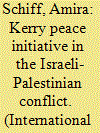

|
|
|
|
|
| Summary/Abstract |
This article examines the factors that contributed to the failure of the last major effort, which was carried out by US Secretary of State John Kerry, to facilitate a Final Status Agreement to resolve the Israeli-Palestinian conflict. The analysis is based on an understanding that every effort to resolve this intractable conflict, even if unsuccessful, is worthy of examination, which can yield interesting observations and insights that may inform future attempts to find a solution. As President Trump’s administration makes intensive efforts to broker an Israeli-Palestinian peace agreement, and the US Middle East negotiation delegation shuttles intensively between the parties and between major regional actors to explore the possibility of renewing official negotiations, this seems like an opportune time to review the major factors that affected the outcome of the previous peace talks.
|
|
|
|
|
|
|
|
|
|
|
|
|
|
|
|
| 5 |
ID:
158142
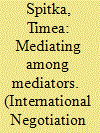

|
|
|
|
|
| Summary/Abstract |
The conditions under which multilateral international intervention are effective in ending a violent conflict is a critical question for scholars and practitioners. Scholarly studies have demonstrated the importance of a united intervention but have been in disagreement over the effectiveness of neutral versus partisan intervention. This article examines the conditions under which mediators construct a consensus on the type of intervention process. What are the factors that enable a consensus on a neutral versus a partisan intervention? Distinguishing between four types of international intervention processes – united-neutral, united-partisan, divided-partisan, and divided neutral and partisan intervention – this article argues that it is a united intervention, whether united partisan or united-neutral, that contributes to creating leverage on conflicting parties to end a conflict. The article examines consensus building among mediators within two divergent case studies: Northern Ireland and Bosnia and Herzegovina.
|
|
|
|
|
|
|
|
|
|
|
|
|
|
|
|
| 6 |
ID:
158137
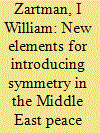

|
|
|
|
|
| Summary/Abstract |
This issue contains an examination of Palestinian-Israeli negotiations with an effort to break through the deadlock strategically. It analyzes the past record of failure and addresses the basic problem of asymmetry. Despite the solutions that have been advanced for all the specific issues, it is the forward-looking matter of trust that is the impediment to productive negotiations. The declaration of a Palestinian state and its recognition by the international community are now the basic elements necessary to break the asymmetry of the parties. A second element – allegedly favored by the Trump administration – is to reduce a symmetry by enlarging the playing field to include surrounding states, as proposed in the 2002 Arab Peace Initiative.
|
|
|
|
|
|
|
|
|
|
|
|
|
|
|
|